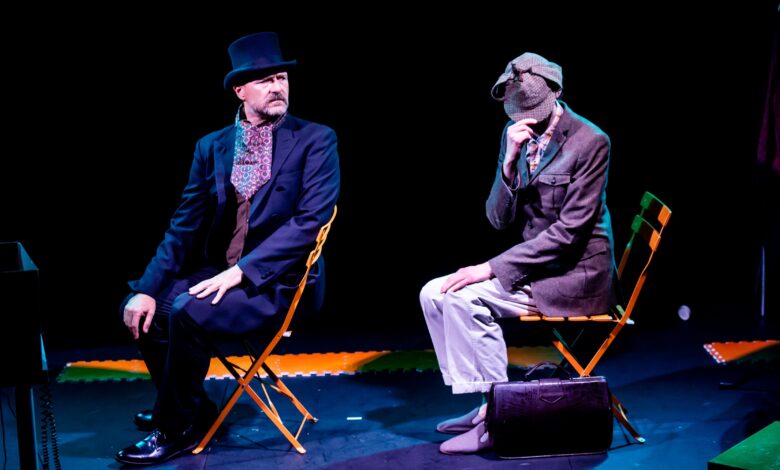Review: The (Curious Case of the) Watson Intelligence, Drayton Arms Theatre
Three stories with four different variations of Watson, this show leaves us questioning our relationship with ourselves, with others, and with our technology. Rating
Good
Steampunk fans rejoice because The (Curious Case of the) Watson Intelligence is currently playing at the Drayton Arms Theatre. The play consists of four different stories which span across three different time periods, all of which surround someone named Watson (Hugo Linton). We have a present day, which consists of two Watsons, one of whom is a young man and part of the ‘dweeb team’, assisting people when they are having problems with technology, whilst another Watson is an uncanny, humanoid, android super-computer, who is the equivalent of a device such as Alexa or Siri. Then there is the Watson who assisted Alexander Graham-Bell with the first telephone. And there is the Dr Watson who is famously known as the sidekick to Sherlock Holmes.
During the first act, all three stories with their four variations on Watson are introduced. We get an idea of the personality of each character, and their relationships with the individuals around them. Each of these relationships really depends on how much their contemporary society is dependent on different forms of technology. For instance, Sherlock Holmes’ Watson is much more aware of his connections with other people, as opposed to android Watson who is very distant from personal relationships. Writer Madeleine George and director Julie Drake are keenly aware of the affect the different Watsons have. They utilise the first act to set the foundation for the second act which concerns itself with the Watsons’ influence on the human condition. There are scenes where characters are pulled away from their technological devices – forced to confront their emotions, and their connections with other people, and upon being separated from technology they are left confused and heartbroken.
The four tales in The (Curious Case of the) Watson Intelligence are told in short interchangeable, increments, reminiscent of the Penny Dreadful stories. With the telling of each, the lights quickly fade, while the actors manage to swiftly change in, or out of certain costumes and switch into their respective characters. The lighting is most effective in one particular scene where Watson and Eliza (Hanna Luna) are sharing an intimate moment together – a soft violet light is on them, and it is utterly beautiful. At first the stage appears to be arranged for three different stories, but as the play continues the settings seems to blend together into one. And as the set blends together, the different stories seem to blend together as well, making the production an almost surreal experience.
The only story which didn’t seem to fit comfortably was that around the Watson who worked alongside Alexander Graham-Bell. It didn’t merge as well with the others towards the end, and the characters had less of an impact on the overall production.
The (Curious Case of the) Watson Intelligence asks the audience to think about Watson. What is it about him? Is he trustworthy? Does he truly see the other characters? Does he want to help? But ultimately, these questions lead to us wondering if it’s Watson we should be thinking about or our own shared human experience.
Written by Madeleine George
Directed by Julie Drake
Sound and Lighting by Isabel Melim
Soundscape by Tomis Fras
Produced by 5Go Theatre Co
The (Curious Case of the) Watson Intelligence plays at the Drayton Arms until Saturday 18 October.






